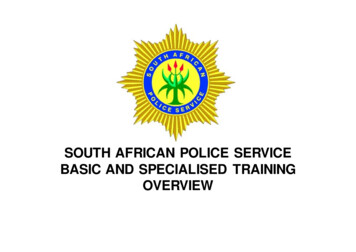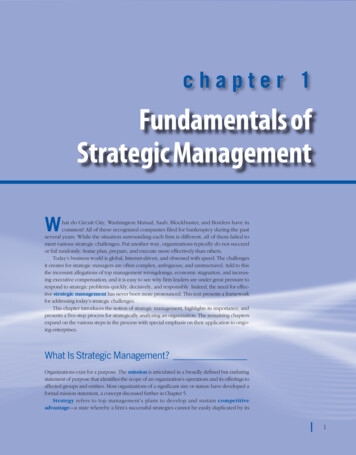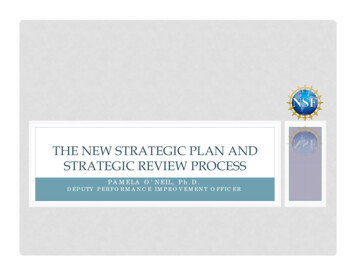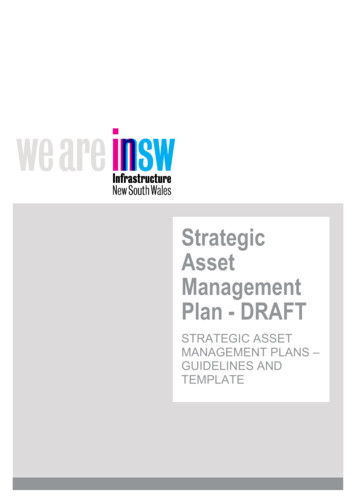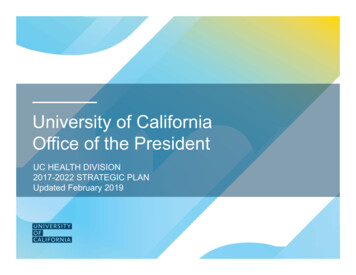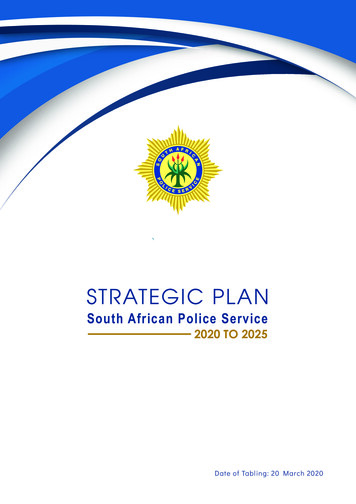
Transcription
STRATEGIC PLANSouth African Police Service2020 TO 2025Date of Tabling: 20 March 2020
STRATEGIC PLAN 2020 TO 2025 SOUTH AFRICAN POLICE SERVICECOMPILED BY:The Strategic Management ComponentSouth African Police ServiceDESIGN AND LAYOUT:SAPS Corporate CommunicationFURTHER INFORMATION ON THE2020 to 2025 STRATEGIC PLAN FOR THESOUTH AFRICAN POLICE SERVICE MAY BE OBTAINED FROM:The Head: Strategic ManagementPrivate Bag X94Pretoria, 0001Tel: 012 393 3082/3SAPS WEBSITE: www.saps.gov.zaRP: 33/2020ISBN: 978-0-621-48125-9i
STRATEGIC PLAN 2020 TO 2025 SOUTH AFRICAN POLICE SERVICELIST OF ABBREVIATIONS/ACRONYMSii4IRFourth Industrial RevolutionAFCFTAAfrican Continent Free Trade AreaAGSAAuditor-General of South AfricaAOPAnnual Operational PlanAPPAnnual Performance PlanARAnnual ReportAUAfrican UnionBMABorder Management AgencyCIPACritical Infrastructure Protection ActCJSCriminal Justice SystemCPACriminal Procedure ActCPFCommunity Police ForumCSFCommunity Safety ForumsCSPSCivilian Secretariat for Police ServicesCSPsCommunity Safety PlansDoCGTADepartment of Cooperative Governance and Traditional AffairsDoJCDDepartment of Justice and Constitutional DevelopmentDPCIDirectorate for Priority Crime InvestigationDPWDepartment of Public WorksDPSADepartment of Public Service and AdministrationDPMEDepartment of Planning, Monitoring and EvaluationGBVFGender-based Violence and FemicideGDPGross Domestic ProductGPSJSGovernance Public Safety and Justice SurveyIS/ICTInformation Systems and Information and CommunicationTechnologyJCPSJustice Crime Prevention and SecurityMISSMinimum Information Security StandardsM&EMonitoring and EvaluationMOSACModus Operandi Strategic Analysis CentreMTEFMedium-term Expenditure FrameworkMTSFMedium-term Strategic FrameworkNAPNational Action PlanNCCSNational Crime Combating StrategyNCPFNational Cybersecurity Policy FrameworkNDPNational Development PlanNDMPNational Drug Master PlanNEPFNational Evaluation Policy FrameworkNPANational Prosecuting AuthorityOCCOperational Command CentreNTSFNational Tourism Safety ForumOCTAOrganised Crime Threat AnalysisPDOsPredetermined ObjectivesPOPPublic Order PoliceROIReturn on investmentSADCSouthern African Development CommunitySAPSSouth African Police ServiceSCMSupply Chain ManagementSDFsSpatial Development FrameworksSDGsSustainable Development GoalsSDIService Delivery ImprovementSDIPService Delivery Improvement PlanSITAState Information Technology AgencySONAState of the Nation AddressSPStrategic PlanSTATSSAStatistics South AfricaVOCSVictims of Crime Survey
STRATEGIC PLAN 2020 TO 2025 SOUTH AFRICAN POLICE SERVICEFOREWORD BY THE MINISTER OF POLICEThe development of the Strategic Plan for the South African Police Service (SAPS)for 2020–2025 was directed by the Medium-Term Strategic Framework (MTSF) 2019–2024, which sets out the strategic direction of the 6th Administration of Government.The final Strategic Plan seeks to address the critical issue of safety and security,which is the bedrock of the entire MTSF and National Development Plan (NDP).Minister of PoliceGENERALBH CELE, MPThe MTSF 2019–2024 epitomises the acceleration of intersectoral efforts and resourcestowards the achievement of the priorities of the NDP and it prioritises the eradicationof economic crime; corruption and fraud; border security and illegal migration; andthe proliferation of firearms. It also addresses the reduction of organised crime; drugsyndicates; gangsterism; trafficking of persons; the impact of illegal mining on theeconomy; and cybersecurity as a threat to the country.Fulfilling the aspirations of this Strategic Plan therefore, will require the South AfricanPolice Service (SAPS) and its partners to play an active and meaningful role in growing South Africa together,towards creating a stable and crime-free environment that is conducive for investment and economic growth.The Strategic Plan is underpinned by key elements of trust; professionalism; increasing access to policing;active community engagement and involvement; the equitable distribution and smarter use of resources;performance management and accountability. The Plan addresses the critical issue of safety and security,which is the bedrock of the entire MTSF and NDP. It, therefore, requires constructive criticism and participativeengagement by all sectors to assist the SAPS in delivering on its mandate.This Plan will inherently be adapted and developed within the context of the targeted impact and outcomes,to ensure the achievement of Government’s current and emerging priorities.As the Minister of Police, I endorse this Strategic Plan for the SAPS. I commit myself and the resources at mydisposal to facilitate its implementation through systematic monitoring and reporting on the organisation’sprogress. I undertake to lead the collaboration of efforts by all stakeholders towards ensuring a safe andsecure South Africa that promotes socio-economic development and ensures a better life for all.General BH Cele, MPMinister of PoliceDate: 16 March 2020iii
STRATEGIC PLAN 2020 TO 2025 SOUTH AFRICAN POLICE SERVICESTATEMENT BY THE DEPUTY MINISTER OF POLICEThe 2019 to 2024 MTSF has intensified Government’s strategic focus on theachievement of the objectives that are reflected in the NDP and commits the SAPS,in particular, to specific outcomes and outputs, during the period 2020 to 2025. TheMTSF and the revised strategic planning process have changed the emphasis andthe measurement of strategic initiatives and require departments to align themselveswith this new approach by changing the way in which they plan and how they measurethe impact of the services that they provide to the people in this country.The Department has used this opportunity to include outcomes and performancemeasures, in this Strategic Plan, that focus on the end-result of the policing servicethat is provided to communities. This end-result is based primarily on the extent towhich the public at large, perceive the SAPS as having delivered on its mandate.Deputy Minister of PoliceMr CC Mathale, MPThis places an obligation on the SAPS to ensure that credible mechanisms thatenable the regular measurement of stakeholder perceptions, are established and theMinistry of Police will play an active role in monitoring progress, in this regard. However, it also requiresactive and positive collaboration with the Department, by all sectors of society but particularly from individualcommunities, which must benefit directly from the implementation of this Plan.The inclusion of these outcome-based performance measures, however, requires that the SAPS demonstrateits willingness to use the results to qualitatively improve the services that it provides. This implies that theremust be a clear link between the APPs that the SAPS develops and implements, during the period 2020 to2025 and the results of the outcome performance measures in the Strategic Plan 2020 to 2025. The Ministryof Police will, therefore, pay particular attention to these results and will focus the SAPS’ efforts on ensuringthat there is a sustained and progressive movement towards the achievement of medium-term targets.The Minister of Police has clearly stated that the Strategic Plan and, in particular the measurement of outcomes,will be developed going forward. This development must be informed by constructive engagements with allstakeholders on the SAPS’ strategic direction to ensure an all-inclusive approach to the establishment of asafe and secure South Africa, within the broader context the Government’s strategic priorities.As the Deputy Minister of Police, I implicitly support the SAPS’ Strategic Plan 2020 to 2025 and will reinforcethe advisory role that the Ministry plays, in guiding the performance of the Department, thereby ensuring themonitoring of the SAPS’ progress with implementation and the progressive development of this Plan.Deputy Minister of PoliceMr CC Mathale, MPDate: 11 March 2020iv
STRATEGIC PLAN 2020 TO 2025 SOUTH AFRICAN POLICE SERVICEINTRODUCTION BY THE NATIONAL COMMISSIONERThe compilation of this Strategic Plan for the SAPS has been directed by the revisedapproach to planning within government, which is designed to re-enforce theimplementation of the outcomes-based approach and accelerate all departmentsand entities towards the achievement of the NDP objectives. The Revised Frameworkfor Strategic Plans and Annual Performance Plans, which was published by theDepartment of Planning, Monitoring and Evaluation (DPME) during 2019/2020,requires government departments to focus their strategic planning on the achievementof impacts and outcomes, within the context of the strategic direction provided byGovernment.The SAPS has identified an impact statement that reinforces the critical role thatsafety and security has to play in this overarching strategic direction for the country,National Commissionernamely; a safe and secure environment that is conducive for social and economicGENERALstability, supporting a better life for all”. This impact statement clearly indicates thatKJ SITOLE (SOEG)the socio-economic advancement of the country, as directed by the MTSF 2019 to2024, is underpinned by the actual and perceived levels of safety and security inthe country. The SAPS realises its leading role in realising this impact but also understands that this cannotbe achieved without the committed involvement and active participation of every citizen of this country andevery stakeholder, in all sectors, who have a vested interest in a safe and secure South Africa. The SAPS hasidentified five outcomes that it has linked directly to the impact statement, as preconditions of the realisationof this impact. The implications of the identification of these outcomes is that at the end of the five-year period,applicable to this Strategic Plan, the SAPS will look back and be certain that it has upheld and enforced lawand order, in support of the stamping of the authority of the State and that it has thoroughly and responsivelyinvestigated every crime that has been reported to its service points, has ensured that the key policingfunctions are intelligence-led, has uncompromisingly implemented a collaborative, consultative approachto policing, as well as has established a police service that is characterised as being both professional andcapable.It is important to note that the Strategic Plan will be implemented over a five-year period and its primarypurpose is to guide the annual direction of the organisation, which is reflected in concomitant APP. The effectiveimplementation of the strategic direction that is encapsulated within the impact statement and outcomes, will,however, be dependent on the annual review of the progress that has been achieved with the implementationof the Strategic Plan itself. This annual review may necessitate that the performance measures that are usedto assess the extent of the implementation of the Strategic Plan, are updated, taking actual performance andchanges to the internal and external environments into consideration. The SAPS will, therefore, collaboratewith all stakeholders, within all sectors, who provide constructive, value-added contributions to the Plan,towards the qualitative improvement of the measurement of the Strategic Plan and the cascading of theresults of this measurement and the improvements required, throughout the organisation.The implementation of the SAPS’ Strategic Plan 2020 to 2025 will require the committed participation of allrelevant stakeholders, but in particular of every SAPS member, whose collaborative and steadfast efforts areneeded to ensure its successful implementation. I, therefore, call on every citizen of this country and everymember of this organisation, to constructively contribute to the realisation of the impact and outcomes thatthe SAPS’ Strategic Plan 2020 to 2025, is striving to achieve.vNational Commissioner: South African Police ServiceGeneral KJ Sitole (SOEG)Date: 2 March 2020
STRATEGIC PLAN 2020 TO 2025 SOUTH AFRICAN POLICE SERVICEINTRODUCTION BY THE NATIONAL HEAD OF THEDIRECTORATE FOR PRIORITY CRIME INVESTIGATIONTo install investor confidence and stimulate economic development, the Directoratefor Priority Crime Investigation (DPCI/Directorate/Hawks) shall enhance its capacity interms of resources, skills and operations.The DPCI, as established in terms of Section 17C of the South African Police ServiceAct 1995, (Act No 68 of 1995), is mandated to investigate national priority offences,as provided for in terms of Section 17D of the SAPS Act. In turning the tide, theDirectorate will focus on enhancing the investigation of serious corruption, seriousorganised crime and serious commercial crime.National CommissionerLt Gen (Dr/Adv)SG LEBEYA (SOEG)In investigating serious corruption, the Anti-Corruption Task Team and OperationalCommittee shall continue to be enhanced by mobilising of stakeholders to supportthe mandate of the DPCI and the priorities of government. The Directorate shall alsosupport the work of the Ministerial Committee, in terms of Section 17I of the SAPS Act.During our efforts to eradicate corruption in the Public Sector, we will work closelywith the Auditor-General of South Africa (AGSA).Our efforts will strive towards making sure that those individuals who are plundering the economic resourcesof South Africa are brought to book and face the consequences of their actions. Ultimately, our efforts areaimed at reversing the current perception that corruption is thriving in South Africa.The Directorate will continue to counter the “mob operational” method of organised criminal groups with amultidisciplinary teamwork approach, as opposed to an individual approach. Investigative projects and majorinvestigations will be designed to, not only increase the number of arrests for serious crime, but also to ensureconvictions in court. Our investigations will be across all commodities but a focused approach will be madetowards those crimes impeding on the feeling of safety of our communities such as the proliferation of drugs,firearms and ammunition, as well as crimes targeting the environmental wellness of the country and crimesagainst the State.The current threat of cyber-related and economic crimes demands an effective response by the DPCI, whichmust work closely with the Asset Forfeiture Unit to ensure ill-gotten gains are attached.Strategically, we acknowledge the critical role of the National Prosecuting Authority (NPA) to ensure convictionsin court. Over the medium-term, we will revisit the demarcation threshold for cases allocated to the DPCI forinvestigation. This purification process shall eliminate perceived competition and encourage a complimentaryapproach between all investigative authorities.The newly approved organisational structure of the Directorate provides for a uniformed approach at nationaland provincial levels, in all three operational legs of the Directorate. The structure also creates room forgrowth and the retention of skilled personnel within the Directorate. The structure will be capacitated in themedium term giving full effect to the capacity of the DPCI to fulfil its mandate.The integrity of personnel attached to the DPCI remains an integral part of the work they do and the mannerin which they conduct themselves. We will be guided by Section 195(1) of the Constitution, Section 17B (b)and Section 17E of the SAPS Act, to ensure that the integrity of members is beyond reproach.In ensuring effective governance, the concept of, Assessment, Implementation and Monitoring (AIM) willcontinue to ensure that the Directorate performs effectively and efficiently. The approach requires assessmentof the current situation and the identification of gaps and inconsistencies, implementation of corrective actionsand monitoring of achievements and progress.viAlthough there are pockets of excellence, our oversight bodies have identified shortcomings in our monitoringand reporting processes which need to be improved. To this end, the Directorate will implement an improvedmonitoring process, which will also function as an early warning mechanism to identify areas of underperformance. Ultimately, the DPCI is working towards system based monitoring to keep track of our data andperformance.
STRATEGIC PLAN 2020 TO 2025 SOUTH AFRICAN POLICE SERVICEOther areas of priority includes the securing of suitable accommodation, prioritisation of acquiring resourcesand the upgrading of tools of the trade necessary to investigate crime in a technological age. Continuedefforts will be made towards the implementation of Section 17G of the SAPS Act, with regards to conditionsof service, remuneration and allowances of members of the Directorate, as well as Section 17K of the PoliceAct, regarding the establishment of a separate programme.As Management and personnel of the DPCI, we will, with the same commitment, dedication and integritybeyond reproach, continue to fight national priority offences and provide excellent service to the community.Lieutenant General(Dr/Adv) SG Lebeya (SOEG)National Head: Directorate for Priority Crime InvestigationDate: 24 February 2020vii
STRATEGIC PLAN 2020 TO 2025 SOUTH AFRICAN POLICE SERVICEOFFICIAL SIGN-OFFIt is hereby certified that this Strategic Plan 2020 to 2025: Was developed by the Management of the SAPS, under the guidance of the Minister of Police.Takes into account all the relevant policies, legislation and other mandates applicable to the SAPS.Accurately reflects the impact and outcomes that the SAPS will endeavour to achieve, during the period2020 to 2025.Major General L RabieHead: Strategic ManagementDate: 24 February 2020 SignatureLieutenant General PP DimpaneChief Financial OfficerDate: 24 February 2020 SignatureLieutenant General SF MasemolaDeputy National Commissioner: PolicingDate: 24 February 2020 SignatureLieutenant General SC MfaziDeputy National Commissioner:Crime DetectionDate: 2 March 2020 SignatureLieutenant General BC MgwenyaDeputy National Commissioner:Human Resource ManagementDate: 24 February 2020 Signatureviii
STRATEGIC PLAN 2020 TO 2025 SOUTH AFRICAN POLICE SERVICELieutenant General FN VumaDeputy National Commissioner: Asset andLegal Management SignatureDate: 24 February 2020Lieutenant General (Dr/Adv) SG Lebeya (SOEG)National Head: Directorate forPriority Crime InvestigationDate: 24 February 2020 SignatureGeneral KJ Sitole (SOEG)Accounting OfficerDate: 2 March 2020 SignatureMr CC Mathale, MPDeputy Minister of PoliceDate: 11 March 2020 SignatureGeneral BH Cele, MPExecutive AuthorityDate: 16 March 2020 Signatureix
STRATEGIC PLAN 2020 TO 2025 SOUTH AFRICAN POLICE SERVICETABLE OF CONTENTSLIST OF ABBREVIATIONS/ACRONYMS iiFOREWORD BY THE MINISTER OF POLICE iiiSTATEMENT BY THE DEPUTY MINISTER OF POLICEivINTRODUCTION BY THE NATIONAL COMMISSIONER vINTRODUCTION BY THE NATIONAL HEAD OF THE DIRECTORATE FOR PRIORITY CRIMEINVESTIGATION viOFFICIAL SIGN-OFF viiiPART A: OUR MANDATE 11.Constitutional Mandate 12.Legislative and Policy Mandates 13.Institutional Policies and Key Strategies over the Five-Year Planning Period 64.Relevant Court Rulings 7PART B: OUR STRATEGIC FOCUS 95.Vision 96.Mission 97.Code of Conduct 98.Situational Analysis 98.1External Environmental Analysis 98.29.Internal Environmental Analysis 14Strategic Response 17PART C: MEASURING OUR PERFORMANCE 1810.11.Institutional Performance Information 1810.1Measuring the Impact 1810.2Measuring Outcomes and Suboutcomes 1810.3Explanation of Planned Performance over the Five-Year Period 24Key Risks 27ANNEXURE A: DISTRICT DEVELOPMENT MODEL 28ANNEXURE B: 5-YEAR SERVICE DELIVERY IMPROVEMENT PLAN 29x
STRATEGIC PLAN 2020 TO 2025 SOUTH AFRICAN POLICE SERVICEPART A: OUR MANDATE1.Constitutional MandateThe SAPS derives its mandate from Section 205 of the Constitution of the Republic of South Africa,1996.The objects of policing are to prevent, combat and investigate crime;maintain public order;protect and secure the inhabitants of the Republic and their property; anduphold and enforce the law. 2.Legislative and Policy Mandates2.1Acts Impacting Directly on the SAPS, Administered by the Minister of PoliceThe Minister of Police is responsible for the administration of the following legislation: Civilian Secretariat for Police Service Act, 2011 (Act No 2 of 2011).Control of Access to Public Premises and Vehicles Act, 1985 (Act No 53 of 1985).Dangerous Weapons Act, 2013 (Act No 15 of 2013).Explosives Act, 1956 (Act No 26 of 1956).Firearms Control Act, 2000 (Act No 60 of 2000).Game Theft Act, 1991 (Act No 105 of 1991).Intimidation Act, 1982 (Act No 72 of 1982).Independent Police Investigative Directorate Act, 2011 (Act No 1 of 2011).National Key Points Act, 1980 (Act No 102 of 1980).1Private Security Industry Regulation Act, 2001 (Act No 56 of 2001).Protection of Constitutional Democracy Against Terrorist and Related Activities Act, 2004 (ActNo 33 of 2004).Regulation of Gatherings Act, 1993 (Act No 205 of 1993)Second-Hand Goods Act, 2009 (Act No 6 of 2009).South African Police Service Act, 1995 (Act No 68 of 1995).Stock Theft Act, 1959 (Act No 57 of 1959).Tear-Gas Act, 1964 (Act No 16 of 1964).Transfer of the South African Railways Police Force to the South African Police Act, 1986 (ActNo 83 of 1986).In the execution of its constitutional mandate, the SAPS derives its powers and functionsmainly from the following key legislation: 1Criminal Law (Sexual Offences and Related Matters) Amendment Act, 2007 (Act No 32 of2007).Child Justice Act, 2008 (Act No 75 of 2008).Children’s Act, 2005 (Act No 38 of 2005).Criminal Procedure Act, 1977 (Act No 51 of 1977).Please note that the Critical Infrastructure Protection Act 8 of 2019 (“CIPA”) is not yet in operation. It will come into operation on a datedetermined by the President, by notice in the Government Gazette. It mandates the National Commissioner to perform certain functionsassigned in the CIPA,1
STRATEGIC PLAN 2020 TO 2025 SOUTH AFRICAN POLICE SERVICE 2.2Criminal Law (Forensic Procedures) Amendment Act, 2013 (Act No 37 of 2013).Counterfeit Goods Act, 1997(Act No 37 of 1997).Customs and Excise Act, 1966 (Act No 91 of 1966).Diamonds Act, 1986 (Act No 56 of 1986).Disaster Management Act, 2002 (Act No 57 of 2002).Domestic Violence Act, 1998 (Act No 116 of 1998).Drugs and Drug Trafficking Act, 1992 (Act No 140 of 1992).Exchange Control Regulations, 1961.Films and Publications Act, 1996 (Act No 65 of 1996).Financial Intelligence Centre Act, 2001 (Act No 38 of 2001).Immigration Act, 2002 (Act No 13 of 2002).Inquest Act, 1959 (Act No 58 of 1959).Implementation of the Rome Statute of the International Criminal Court Act, 2002 (Act No 27of 2002).International Cooperation in Criminal Matters, 1996 (Act No 75 of 1996).Liquor Act, 2003 (Act No 59 of 2003).Marine Living Resources Act, 1998 (Act No 8 of 1998).Mental Healthcare Act, 2002 (Act No 17 of 2002).National Conventional Arms Control Act, 2002 (Act No 41 of 2002).National Environmental Management Act, 1998 (Act No 107 of 1998).National Road Traffic Act, 1996 (Act No 93 of 1996).National Strategic Intelligence Act, 1994 (Act No 39 of 1994).Non-proliferation of Weapons of Mass Destruction Act, 1993 (Act No 87 of 1993).Older Persons Act, 2006 (Act No 13 of 2006).Precious Metals Act, 2005 (Act No 37 of 2005).Prevention and Combating of Corrupt Activities Act, 2004 (Act No 12 of 2004).Prevention and Combating of Torture of Persons Act, 2013 (Act No 13 of 2013).Protection from Harassment Act, 2011(Act No 17 of 2011).Prevention of Organised Crime Act, 1998 (Act No 121 of 1998).Safety at Sports and Recreational Events Act, 2010 (Act No 2 of 2010).Sexual Offences Act, 1957 (Act No 23 of 1957).State of Emergency Act, 1997 (Act No 64 of 1997).The Prevention and Combating of Trafficking in Persons Act, 2013 (Act No 7 of 2013).The Regulation of Interception of Communication and Provision of Communication-relatedInformation Act, 2002 (Act No 70 of 2002).Policies Impacting on the SAPSNational Development PlanThe NDP is a long-term vision, for the country which provides a broad strategic framework to guidekey government choices and actions and focuses on the critical capabilities needed to transformthe economy and society. The plan highlights that accelerated development in South Africa requiresthe active support of all citizens; leadership in all sectors that puts the country’s collective interestsahead of narrow, short-term goals; and radically improved government performance.2Medium-term Strategic Framework 2019 to 2024The MTSF outlines the country’s priorities according to the electoral mandate and provides amedium-term roadmap for developing five-year institutional plans to enable the NDP’s goals tobe achieved. Intergovernmental and interdepartmental planning is crucial in the achievement ofgovernment’s priorities and vision for South Africa. The MTSF promotes coordination and alignment
STRATEGIC PLAN 2020 TO 2025 SOUTH AFRICAN POLICE SERVICEof priorities across all spheres of government and with non-government stakeholders, as well asassisting with the integration of all components of national development, into mainstream planningprocesses.White Paper on Safety and SecurityThe White Paper provides direction to government departments in the development and alignmentof their respective policies, strategies and operational plans to achieving safer communities. Inaddition, the White Paper provides governance and oversight tools against which departments canbe measured and held accountable. The objectives of the White Paper on Safety and Security areto: provide an overarching policy for safety, crime and violence prevention that will be articulatedin a clear legislative and administrative framework to facilitate synergy and alignment of policieson safety and security; and facilitate the creation of a sustainable, well-resourced implementationand oversight mechanism, which will coordinate, monitor, evaluate and report on implementation ofcrime prevention priorities across all sectors.White Paper on PolicingThe White Paper on Policing separates the police focused policy from that of the broader policy onsafety and security contained in the White Paper on Safety and Security and provides an enablinglegislative framework for civilian oversight and additionally aligns the police service to the rest ofthe public service. The focus of the White Paper on Policing is on the core areas of policing and lawenforcement, aimed at reducing crime and building safer communities, as called for by the NDP.Spatial Development FrameworksSpatial transformation and inclusive economic growth remain elusive despite an enabling legislativeand policy environment. Spatial planning, infrastructure investment and social developmentexpenditure by the post-apartheid state and the private sector have reproduced, entrenched andin some cases reinforced these historic spatial patterns. The purpose of Spatial DevelopmentFrameworks (SDFs) is to radically change the rationale for and rules by which planning, budgetingand infrastructure investment and development spending in the country take place.United Nations Sustainable Development GoalsThe aim of the Sustainable Development Goals (SDGs) is to end poverty and hunger globally; combatinequalities within and among countries; build peaceful, just and inclusive societies; protect humanrights; promote gender equality and the empowerment of women and girls; and ensure the lastingprotection of the planet and its natural resources. Countries committed to the SDGs aim to createthe conditions for sustainable, inclusive and sustained economic growth, shared prosperity anddecent work for all, taking into account different levels of national development and capacities. TheSDGs are integrated and indivisible and balance the three dimensions of sustainable development:the economic, the social and the environmental. There are 17 SDGs, demonstrating the scale andambition of this global agenda.Agenda 2063Agenda 2063, published by the African Union (AU) Commission in 2015, is a strategic frameworkfor the socio-economic transformation of Africa over the next 50 years. It builds on and aims toaccelerate implementation of, past and existing continental initiatives for growth and sustainabledevelopment. Agenda 2063 has the following aspirations: an integrated continent, politically unitedand based on the ideals of Pan-Africanism and the vision of Africa’s Renaissance; an Africa ofgood governance, democracy, respect for human rights, justice and the rule of law; a peaceful andsecure Africa; an Africa with a strong cultural identity, common heritage, shared values and ethics;an Africa whose development is people-driven, relying on the potential of African people, especiallyits women and youth and caring for children; and an Africa that is a strong, united and an influentialglobal player and partner. These aspirations have priority areas aligned to the SDGs.Policy Framework for the Government-wide Monitoring and Evaluation SystemA monitoring and evaluation system is a set of organisational structures, management processes,standards, strategies, plans, indicators, information systems, reporting lines and accountability3
STRATEGIC PLAN 2020 TO 2025 SOUTH AFRICAN POLICE SERVICErelationships, which enable national and provincial departments, municipalities and other institutionsto discharge their monitoring and evaluation (M&E) functions effectively. In addition to these formalmanagerial elements are the organisational culture, capacity and other enabling conditions, whichwill determine whether the feedback from the M&E function influence the organisation’s decisionma
The development of the Strategic Plan for the South African Police Service (SAPS) for 2020-2025 was directed by the Medium-Term Strategic Framework (MTSF) 2019- 2024, which sets out the strategic direction of the 6th Administration of Government. The final Strategic Plan seeks to address the critical issue of safety and security,
